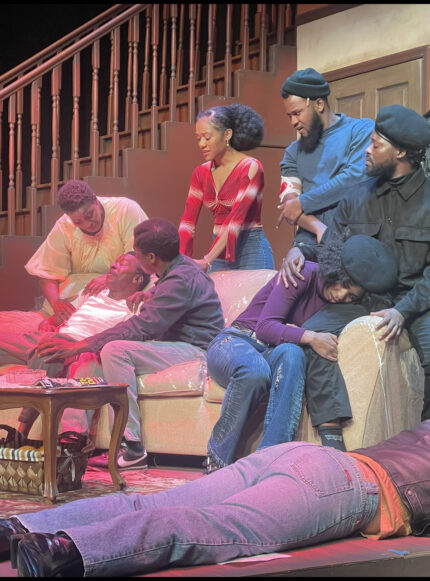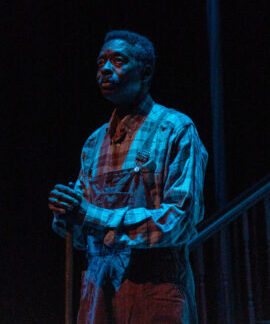
Violence leaves carnage in the Williams’ home in M Ensemble Company’s The River Niger / Photo by Chasity Hart
By Bill Hirschman
If you are a long-time theatergoer, there are plays you’ve heard about for years, maybe decades, that you’ve never seen. For this critic, The River Niger has been one of those – a legendary 1972 Obie-winning, then Tony-winning play about Black life that rarely gets a high-profile revival.
Thanks to the Miami’s M Ensemble Company, this stunning script that captures a crossroads in Black life in America now gets a solid revival that still has echoes a half-century later.
Warning way up front: under André L. Gainey’s otherwise smooth laudable direction, this three-act play needlessly runs 3 hours and 5 minutes with only one short intermission 2 hour 10 minutes in. So come expecting a vibrant journey with a few dragging moments, bring some patience and leave the kids at home (which some folks opening night did not).
But playwright Joseph A. Walker gifts the audience with a vivid depiction of passionate, intelligent people debating diametrically opposed philosophies of how Black citizens should fight for justice in a racist world they long ago wrote off as far as being treated with respect. One young person wants to become a lawyer and attack the system from the outside. Another is a kind of Black panther planning to use dynamite to blow up a public building. A father is still seeking, after years of searching in vain, the most effective metaphorical “battlefield” in which to invest their efforts.
All this occurs within the warm and supportive environment of an extended multi-generational family in Harlem awash in bickering, affection, ribbing, drinking, singing, support, pride, disappointment and sacrifice.
But we have to delay getting into the plot. Walker’s ultimate and most rewarding gift is for language: a meld of street parlance, lyrical poetry, unrestrained passion, all liberally punctuated with obscenities, frank sexual references and frequent use of the N-word. Indeed, the patriarch, house painter John Williams, highly educated in the arts but frustrated by circumstance, spends much of the play writing a breathtakingly imagistic poem sharing Walker’s title that he delivers near the end of the evening.
Set in the time the play was written, the Williams family is preparing for the return visit of their son Jeff who has been studying to be a navigator as a lieutenant in the Air Force. Father John (Chat Atkins) could not be prouder as he debates politics with his cousin from next door Dudley (Keith C. Wade), a wryly cynical doctor with a lush Jamaican accent and no belief that change is possible. John describes his own social impotence, “I’m a fighter who ain’t got no battlefield.”
Also awaiting Jeff is his salt-of-the-earth mother Mattie (Jade L. Jones) who says she’s bitter and filled with bile, but actually exudes compassion and strength. Doddering around the house is her flinty mother Wilhemina (Carolyn Johnson-Davis). John and Wilhemina are both world class alcoholics snatching bottles from various hiding places in the living room and kitchen on view.
Jeff’s likely fiancé, Ann Vanderguild (Tyquisha Ariel Braynen), a South African nurse he met in Canada, unexpectedly arrives a day before Jeff to meet his family. Although a lovely attentive person on the outside, she harbors the deep resentful pain of her father being unjustly jailed and tortured in a South African prison.
But appearing suddenly is Big Moe Hayes (Jean Hyppolite), a threatening-looking activist who is running the “gang” that Jeff once created with him, in those days to address neighborhood problems. Since Jeff left, the group has become more militant and connected to at least one murder amid a commitment to revolution. Moe has brought along a gang of followers (Martin Davis, Xavier Latortue, Kedar Myers) and his devoted girlfriend Gail (Nairobi), one of whom is likely a police informant.
Jeff (Roderick Randle) finally arrives, sparking a raft of consequences. To begin with, he reveals he left (was forced out of) the Air Force because he strongly felt he did not fit in that role. He locks horns with a shattered John who had seen his son as the breakthrough both for the family and racial issues. But that is only one of several secrets that emerge and clash as tempers erupt and violence seems imminent.
Walker is documenting a crossroads moment, technically in the post-Civil Rights Era, when Blacks are trying to conquer another level of social inequities although experience has taught them not to count on society at large. Lines abound like, “I don’t believe in this country anymore” and “This country needs to be torn down.” There is a sense of a people coming into a new phase of self-determination reminiscent of adolescence. As one says, “We, as a people, got a lot of growing to do.”
Only half-joking, John berates Dudley: “Look, my West Indian corn roaster, I accept the fact that you’re a gutless black aristocrat, going thumbs up or thumbs down while your brothers and sisters are being fed to the Lions Club.”

Chat Atkins as John Williams
Most of the 11-member cast is at the top of their game, with some people offering some of the best work we’ve seen in their careers here. Top of the list is Atkins who has led numerous M Ensemble pieces but here triumphs as John. The character is likely 20 years older than Atkins but you’d never know it from how the actor disappears into the life-battered artist who has happily retreated into an alcoholic haze with staggering tread only to emerge when circumstances require it. Adkins’ rendering of John’s masterwork poem in Act Three is akin to listening to music inherent in words.
Randle, who has been in numerous supporting performances until scoring this season with a lead in Main Street Players’ Topdog/Underdog, is a vital Jeff simultaneously lost in what he will do next and yet knowing he does not want to retreat into the various lives modeled before him. When necessary, his Jeff rages with a volcanic fury born out of the newly-certain knowledge that he cannot be who his family wants him to be and that society has the deck stacked against him.
Johnson-Davis, who we’ve revered since 2006 in Fabulation at the Public Theatre, once again inhabits a grandmother, this one you think is far gone into sleepwalking senility and alcoholism until she surprises you.
Jones, an Orlando-based actress who won acclaim in Slow Burn Theatre’s Once on This Island, instills Mattie with that classic quality as the pillar of the family who is both supportive of the flawed people she loves and yet sees them clearly.
Wade, a mainstay of local theater for years, creates a convincing man who has achieved some success as the neighborhood’s doctor but who has lost all faith in the likelihood of achieving anything. He only half-jocularly says he will help ease headaches and minor ills, but thinks he ought to let the mortally ill just die.
The rest of the cast does dependable work. Most of them provide an array of accents and varied vocal cadences that Walker has written for them.
Among the many virtues of Gainey’s production and his cast – especially Atkins’ John and Wade’s Dudley — makes the frequent socio-political debates sound integrated into the everyday conversations, a kind that friends enjoy indulging in over glass of scotch. Dudley teases John, calling him an “African Warrior” knowing John has no targeted plans for fighting back, and John calls Dudley a “Black Jew doctor.”
Per the script, much of the play is underscored by a rippling of bass guitar notes mixed often with the rhythms of African drums, plus characters singing gospel songs and some Smokey Robinson and Isaac Hayes thrown in. It helps set the mood but those bass notes get a little overused and intrusive.
Mitchell Ost, who has created numerous environments for M Ensemble, has built a modest home for the Williams with nice touches such as a wall photo of what must be a generation just after slavery and plastic slipcovers on the living room sofa. The changing moods are underlined by the lighting of Quanikqua “Q” Bryant.
The length of the work is debatable both on paper and in production. It’s a three-act play, but M Ensemble has decided not to have an intermission between Acts One and Two. A lot of people accustomed to 90-minute comedies left opening night at the first intermission and some, expecting a tighter evening, didn’t even wait for that. Too bad. It was their loss.
Part of the length was Gainey allowing certain wordless interludes drag on at a leisurely pace, such as Grandma pouring drinks, and Walker gave Wilhemina many opportunities to shut down the action to putter around aimlessly muttering. Walker’s script may be a fine piece of playwriting but he sure could have used a dramaturg.
The play does start to get muddled in the last scenes as Walker tries to find a believable resolution to the convergence of problems and issues. Further, the cast opening night seemed to lose some of their energy as the third act slogged on, other than John’s reciting of the poem and Jeff’s final explosion at his family.
But Gainey has expertly cohered the cast into a strong emotionally affecting vision. It is a testament to his skill that The River Niger is infused with Walker’s vision about destiny, dignity and a search for how find the power to shape your future.
The River Niger at M Ensemble runs through Feb. 26 at the Sandrell Rivers Theater, 6103 N.W. Seventh Ave., Miami. 8 p.m. Thursday-Saturday, 3 p.m. Sunday. Tickets $36. Running time 3 hours 10 minutes with one brief intermission. Call (305) 200-5043 or visit themensemble.com.







 A PaperStreet Web Design
A PaperStreet Web Design
